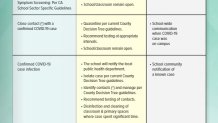Students across San Diego County are back at school in person, but returning to campus also means they could be sent home if they're exposed to COVID-19 or develop symptoms.
While health and safety guidelines have been ever-changing throughout the pandemic, school districts such as San Diego Unified have guidance on what to do if a student does begin to experience COVID-19 symptoms, which can be wide-ranging.
According to the school district, if a student has a COVID-19 symptom the school recommends they stay home and test. If they are a close contact with a confirmed COVID-19 case, the school asks that they quarantine and possibly test. And if the child does test positive they should stay home return to class 48 hours after symptoms go away.

Get San Diego local news, weather forecasts, sports and lifestyle stories to your inbox. Sign up for NBC San Diego newsletters.
As for what types of symptoms, doctors understand every little sneeze can’t be scrutinized. The CDC and the California Department of Public Health consider a cough, sore throat, congestion, runny nose and even a headache as a COVID-19 symptom, along with the other more clear signs of the coronavirus.
"Just for spread prevention and good public health measures, if someone is ill they should be kept home until they have been cleared to return," said Dr. David Bazzo, interim chair of UC San Diego Health’s Family Medicine Department.
Dr. Bazzo stresses monitoring symptoms and practicing other preventative measures can also help in avoiding other illnesses like RSV or the flu.
Local
"With our other factors that we've been using: masking, hand washing, social distancing these work on all infectious diseases, not just COVID-19, not just influenza and not just RSV," said Dr. Bazzo. "Those are good measures to take in general with regards to prevention."
Pediatricians and doctors say prevention is key, and one aspect of that is getting the COVID-19 vaccine as well as the flu shot.
"If we get people vaccinated, we know that disease burden will be less and we will be able to get to that point where we can return to the 'normal' where we will not need to have as much precautions as we are having currently," said Dr. Bazzo.
Right now, kids 12 and up are eligible to get the COVID-19 vaccine, and Pfizer is working on getting emergency authorization for vaccines for kids 5 to 11 years old.



